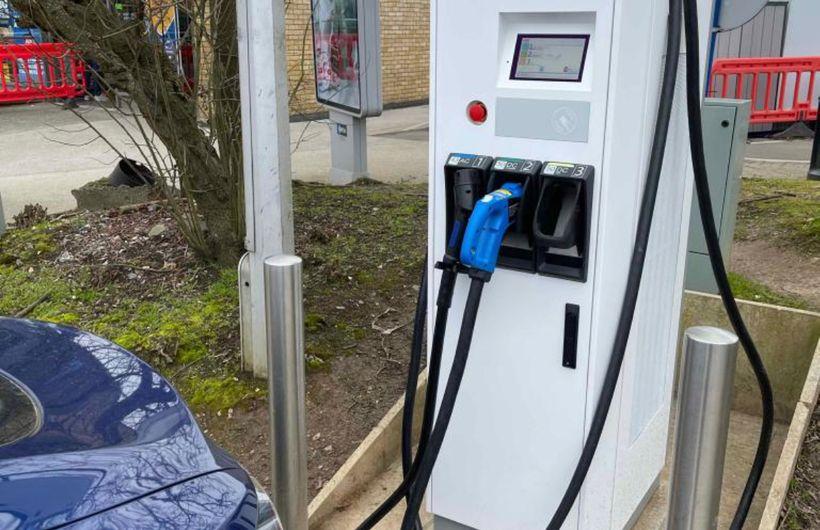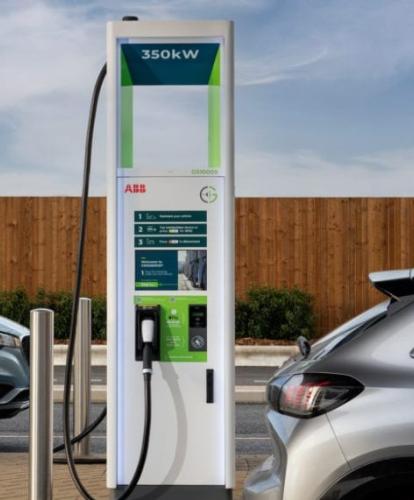Green energy company Ecotricity and GRIDSERVE, a pioneer in sustainable energy solutions, have today announced a major new collaboration. Together they will radically develop the Electric Highway, Europe’s first nationwide charging network, in order to transform electric vehicle (EV) charging facilities on motorways and major roads across Britain.
There are two elements to the transformation, which is already underway. First, all existing chargers will be replaced with new technology, doubling the capacity and offering all three connection types (CCS, CHAdeMO and AC) as well as contactless payment. Second, the two companies will be rolling out six to 12 high-power 350kW devices at all motorway service areas. This will both increase capacity and reduce waiting times. For EVs that can take this speed of charge, these ultra-rapid chargers will add around 100 miles of charge in five minutes.
GRIDSERVE has taken a 25% stake in the Electric Highway. It also brings its front and back-office technology and expertise to the upgraded network, which will have 24/7 support. Funding for the program is being provided by Hitachi Capital (UK) PLC, which is also a shareholder in GRIDSERVE.
Work has already begun on the first expected 350kW location, at Moto’s new site at Rugby. However, unbranded chargers have already started to appear, as a result of upgrading broken chargers. A new, unbranded charger has been spotted at the Cherwell Valley Services on the M40. Zapmap users will be able to see that chargers have been upgraded, initially by a comment in the notes field on the “i” tab within the charge point info.

The unbranded charger at Cherwell Valley. Image courtesy of Baz Street.
Dale Vince, Founder, Ecotricity, said:
“I’m a fan of GRIDSERVE’s Electric Forecourt concept, their vision and passion in this space. To be able to work together to make sure the Electric Highway continues to lead the electric car revolution in Britain is an exciting prospect.
“The Electric Highway kickstarted Britain’s electric car revolution – one decade ago this summer, and together with GRIDSERVE we have big plans for the second decade – and the end of fossil powered cars.”
Toddington Harper, CEO at GRIDSERVE, commented:
“I’ve been driving an electric vehicle for 8 years, and the Electric Highway was the network that originally made that possible. It’s therefore a huge privilege for myself and GRIDSERVE to take a role alongside Ecotricity in the next evolution of the Electric Highway.
“GRIDSERVE’s purpose is to deliver sustainable energy and move the needle on climate change, and the upgraded network will provide the confidence people need to immediately make the transition to a net zero, electric vehicle future. The new network will feature all of GRIDSERVE’s world-leading technology to ensure that electric vehicle charging is straightforward, anxiety free, and delivers an awesome customer experience.”
You can watch Dale Vince, owner of Ecotricity, and GRIDSERVE CEO Toddington Harper talking to Fully Charged’s Robert Llewellyn in the video below.
The Electric Highway, launched in 2011, enabled early electric vehicles to drive the length and breadth of Britain – when 7kW was considered fast and charging was by three-pin-plug.
Charging standards have since leapt to 50kW, 150kW and the new 350kW, while the range of new electric cars has increased from 80 to 300 miles (or more, in some cases). Alongside rapid price convergence of new electric cars with their fossil fuel counterparts, this technical progress means that over 215,000 pure-electric cars now drive on UK roads, with more than 10% of all new car sales being plug-in vehicles.



